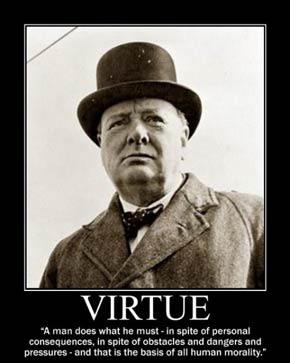
All through the Battle of Britain, during the air raids on London, Churchill would stand on the top of a government building with his arms outstretched. He would be still dictating to his Private Secretary as they watched the bombs dropping all around them, and she would later say, as did everyone who knew him in those times, that "it was completely impossible to feel fear when you were in Winston's presence". Such is testimony to the attainment of this Master Alchemist!.
From a small boy I looked to Winston Churchill as a source of inspiration as to what a great man looks like in action. In a small country town I found few suitable role models, he gave me ideas and understandings for which I am deeply grateful. Winston felt as though he was always walking with destiny. He was criticised by many as being fickle yet he always felt that he was working towards a rendezvous with a greater calling. He said "When you know that you have a date with destiny you jump on whatever nag is available and ride it as long as its lasts, then you jump on the next one, and so on. All that matters is that you end up in the right place at the right time with the right skills, then you wait for your time to come."
Without Winston Churchill the world would have been plunged into another dark age. We have a lot to thank him for. He was one of the very few who could see the darkness coming. He strenuously opposed the policy of appeasement with the Nazi's. When Britain and France negotiated a peace settlement with Germany wherein the Nazi's agreed to not attack Britain if they were allowed to take Czechoslovakia unopposed Churchill declared it as a shameful defeat. He loudly declared "that the policy of appeasement was like feeding our friends to the crocodiles in the hope that we would be eaten last". No doubt he had Neville Chamberlain in mind when he said it. Only he could see that the Nazi's meant the end of the free world and the end of the democratic ideal. When he replaced Chamberlain to became Prime Minister in 1940, thousands of Britains wrote to him and pleaded which him to negotiate a peace on any terms. He hand signed a reply to each and every letter telling the sender that he was returning their shameful letter so that they could "burn it and forget it'. No one believed Britain could oppose the might of the Third Reich except Churchill. He re-instilled hope and the fighting spirit into the British people and he orchestrated an alliance between Britain, America and Russia which drove back the darkness. The scriptures talk about one who would come and single-handedly stand against the darkness and vanquish it..... well, he has been and gone my friends... it was Winston Churchill.
Winston Churchill (d.1965) was born on November 30, 1874, the son of an American mother and British Aristocrat Father. He has often been referred to as America’s favourite son. His English father and connections, along with his own personal abilities and ambition, made it possible for him to become the Prime Minister of Great Britain in her darkest hour.
According to the law of the day, he could not inherit his American mother’s citizenship. Instead, thanks to his own achievements, he was the first person to ever become an honorary citizen of the United States. President Kennedy, upon confirming American citizenship on Churchill, said:
"We meet to honour a man whose honour requires no meeting - for he is the most honoured and honourable man to walk the stage of human history in the time in which we live. Whenever and wherever tyranny threatened, he has always championed liberty. Facing firmly toward the future, he has never forgotten the past"
Born into the aristocratic family of the Dukes of Marlborough, a branch of the noble Spencer family, Winston Leonard Spencer-Churchill, like his father, used the surname Churchill in public life. From age two to six, he lived in Dublin, where his grandfather had been appointed Viceroy and employed Churchill's father as his private secretary.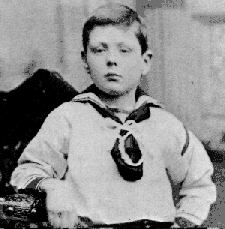 Churchill's earliest exposure to education occurred in Dublin, where a governess tried teaching him reading, writing, and arithmetic. With limited contact with his parents, Churchill became very close to his nanny, 'Mrs' Elizabeth Anne Everest, whom he called 'Old Woom'. She served as his confidante, nurse, and mother substitute.
Churchill's earliest exposure to education occurred in Dublin, where a governess tried teaching him reading, writing, and arithmetic. With limited contact with his parents, Churchill became very close to his nanny, 'Mrs' Elizabeth Anne Everest, whom he called 'Old Woom'. She served as his confidante, nurse, and mother substitute.
Independent and rebellious by nature, Churchill generally did poorly in school, for which he was punished. He was educated at three independent schools: St. George's School, Ascot, Berkshire; Brunswick School in Hove, near Brighton and at Harrow School. Within weeks of his arrival at Harrow, Churchill had joined the Harrow Rifle Corps. He earned high marks in English and History, and was the school's fencing champion.
Rarely visited by his mother, and wrote letters begging her either to come to the school or to allow him to come home. His relationship with his father was distant; he once remarked that they barely spoke to one another. His father died on 24 January 1895, aged 45, leaving Churchill with the conviction that he too would die young and so should be quick about making his mark on the world. Churchill described himself as having a "speech impediment" which he worked to overcome.
After Churchill left Harrow in 1893, he applied to attend the Royal Military College, Sandhurst. It took three attempts before he passed the entrance exam; he applied for cavalry rather than infantry because the grade requirement was lower and did not require him to learn mathematics, which he disliked.
In 1895, Churchill travelled to Cuba to observe the Spanish fight the Cuban guerrillas; he had obtained a commission to write about the conflict from the Daily Graphic. To his delight, he came under fire for the first time on his twenty-first birthday.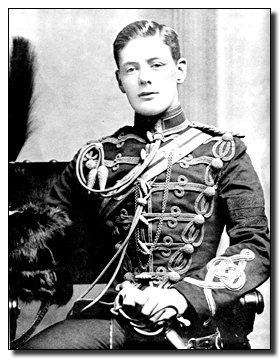 In early October 1896, he was transferred to Bombay, British India. He was considered one of the best polo players in his regiment and led his team to many prestigious tournament victories.
In early October 1896, he was transferred to Bombay, British India. He was considered one of the best polo players in his regiment and led his team to many prestigious tournament victories.
In 1897, Churchill attempted to travel to both report and, if necessary, fight in the Greco-Turkish War, but this conflict effectively ended before he could arrive. Later, while preparing for a leave in England, he heard that three brigades of the British Army were going to fight against a Pashtun tribe in the North West Frontier of India and he asked his superior officer if he could join the fight.
Churchill was transferred to Egypt in 1898. He visited Luxor before joining an attachment of the 21st Lancers serving in the Sudan under the command of General Herbert Kitchener. During this time he encountered two military officers with whom he would work during the First World War: Douglas Haig, then a captain and David Beatty, then a gunboat lieutenant. While in the Sudan, he participated in what has been described as the last meaningful British cavalry charge, at the Battle of Omdurman in September 1898. He also worked as a war correspondent for the Morning Post.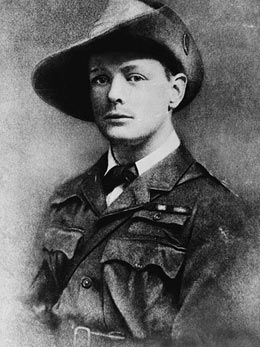 He soon had his first opportunity to begin a Parliamentary career, when he was invited by Robert Ascroft to be the second Conservative Party candidate in Ascroft's Oldham constituency. Ascroft's sudden death caused a double by-election and Churchill was one of the candidates. In the midst of a national trend against the Conservatives, both seats were lost; however Churchill impressed by his vigorous campaigning. Newspapers reported the promising future of this unusual young man who had a mystical, almost entrancing presence about him.
He soon had his first opportunity to begin a Parliamentary career, when he was invited by Robert Ascroft to be the second Conservative Party candidate in Ascroft's Oldham constituency. Ascroft's sudden death caused a double by-election and Churchill was one of the candidates. In the midst of a national trend against the Conservatives, both seats were lost; however Churchill impressed by his vigorous campaigning. Newspapers reported the promising future of this unusual young man who had a mystical, almost entrancing presence about him.
Having failed in his bid to enter politics, Churchill looked about for some other opportunity to advance his career. On 12 October 1899, the Second Boer War between Britain and the Boer Republics broke out and he obtained a commission to act as war correspondent for the Morning Post with a salary of £250 per month. After some weeks in exposed areas he accompanied a scouting expedition in an armoured train, leading to his capture and imprisonment in a POW camp in Pretoria. He escaped from the prison camp and travelled almost 300 miles with the assistance of an English mine manager. His escape made him a minor national hero for a time in Britain, though instead of returning home, he rejoined the army. In 1900, Churchill returned to England.
Churchill stood again for the seat of Oldham at the 1900 general election. After winning the seat by a narrow majority, he went on a speaking tour throughout Britain and the United States. In 1901 he joined the Masonic Lodge and by 1902 he had already progressed to become a Master Mason. What became his lifelong love and interest in alchemy had been rekindled and it would serve him well his whole life. During his early days in politics he was described in the newspapers as'a born orator with the power to move people as he wills'. During his first parliamentary session, he opposed the government's military expenditure and Joseph Chamberlain's proposal of extensive tariffs, which were intended to protect Britain's economic dominance. In 1904 he crossed the floor to sit as a member of the Liberal Party. As a Liberal, he continued to campaign for free trade. When the Liberals took office with Henry Campbell-Bannerman as prime minister, in December 1905, Churchill became Under-Secretary of State for the Colonies dealing mainly with South Africa after the Boer War. In 1908, he introduced the Trade Boards Bill setting up the first minimum wages in Britain thus abolishing slave labour. In 1909, he set up Labour Exchanges to help unemployed people find work. He helped draft the first unemployment pension legislation, the National Insurance Act of 1911. As a supporter of eugenics, he participated in the drafting of the Mental Deficiency Act 1913, although the Act eventually passed rejected his preferred method of sterilisation of the feeble-minded in favour of their confinement in institutions. Churchill also assisted in passing the People's Budget. The budget included the introduction of new taxes on the wealthy to allow for the creation of new social welfare programmes. He introduced widows pensions, unemployment benefits and compulsary tea breaks. Churchill's proposed solution to the suffragette issue of giving women the vote was a referendum on the issue, but he was unable to gain parlimentry support and women's suffrage remained unresolved until after the First World War.
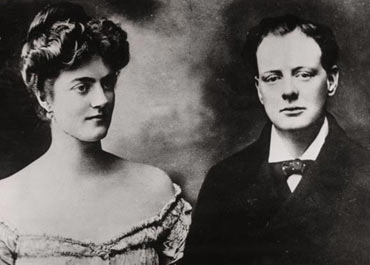 Winston had several love affairs in his twenties and even proposed to the famous actress Ethel Barrymore but she had a great dislike of politics and could not see herself as the wife of a politician. Churchill met his future wife, Clementine Hozier, briefly in 1904. In 1908, they met again at a dinner party and they soon began a lifelong romance. He proposed to Clementine during a house party at Blenheim Palace on 10 August 1908, in a small Temple of Diana. On 12 September 1908, they were married. Their first child, Diana, was born in London on 11 July 1909.On 28 May 1911, their second child, Randolph, was born. Their third child, Sarah, was born on 7 October 1914. Clementine gave birth to her fourth child, Marigold Frances Churchill, on 15 November 1918, four days after the official end of the First World War, the child died of septicaemia on 23 August 1921. On 15 September 1922, the Churchills' last child was born, Mary.
Winston had several love affairs in his twenties and even proposed to the famous actress Ethel Barrymore but she had a great dislike of politics and could not see herself as the wife of a politician. Churchill met his future wife, Clementine Hozier, briefly in 1904. In 1908, they met again at a dinner party and they soon began a lifelong romance. He proposed to Clementine during a house party at Blenheim Palace on 10 August 1908, in a small Temple of Diana. On 12 September 1908, they were married. Their first child, Diana, was born in London on 11 July 1909.On 28 May 1911, their second child, Randolph, was born. Their third child, Sarah, was born on 7 October 1914. Clementine gave birth to her fourth child, Marigold Frances Churchill, on 15 November 1918, four days after the official end of the First World War, the child died of septicaemia on 23 August 1921. On 15 September 1922, the Churchills' last child was born, Mary.
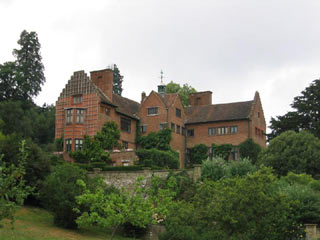 Also in Sptember, 1922, and against his wife's wishes he bought Chartwell, which would be Winston's home until his death in 1965. Winston and Clementine never shared a bedroom. She liked to retire and rise early while Winston liked to work during the night and go to bed at three or four in the morning. They wrote love notes and letters to each other everyday yet only shared a bed when Winston received a written invitation to do so. Although they were very close they did not need to be together all the time. Theirs was a great love affair, they took every opportunity available to be openly affectionate with each other, which was not really the convention of the time. Clemy, as her friends knew her, was a well educated, sophisticated woman, who was Winston's intellectual equal. They would often debate in public, even in the presence of visiting dignitaries, often much to the disgust of the more conventional English Aristocrats present. In his later years Winston traveled extensively with his children as companions. He used to say that "he spoke more to his children in one weekend than his father had spoken to him his entire life".
Also in Sptember, 1922, and against his wife's wishes he bought Chartwell, which would be Winston's home until his death in 1965. Winston and Clementine never shared a bedroom. She liked to retire and rise early while Winston liked to work during the night and go to bed at three or four in the morning. They wrote love notes and letters to each other everyday yet only shared a bed when Winston received a written invitation to do so. Although they were very close they did not need to be together all the time. Theirs was a great love affair, they took every opportunity available to be openly affectionate with each other, which was not really the convention of the time. Clemy, as her friends knew her, was a well educated, sophisticated woman, who was Winston's intellectual equal. They would often debate in public, even in the presence of visiting dignitaries, often much to the disgust of the more conventional English Aristocrats present. In his later years Winston traveled extensively with his children as companions. He used to say that "he spoke more to his children in one weekend than his father had spoken to him his entire life".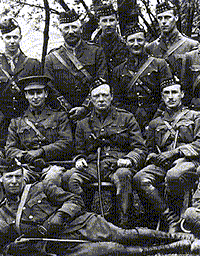
Churchill was First Lord of the Admiralty at the start of the First World War, but was obliged to leave the war cabinet after the disastrous Battle of Gallipoli which he had helped to plan. Although he was not truly responsible for the disaster he was used as a scape goat by the parliament. He had wanted it to be solely a Naval campaign and opposed the use of ground troups so laying blame upon him for the great loss of life of ground forces was somewhat unfair. Many actually felt at the time that spies had leaked the plans to Turkish forces which explained why they were so well prepared for the initial naval bombardment.
After spending some time as a Major with the 2nd Battalion, Grenadier Guards, he was appointed Lieutenant-Colonel, commanding the 6th Battalion, Royal Scots Fusiliers (part of the 9th (Scottish) Division), on 1 January 1916. Correspondence with his wife shows that his intent in taking up active service was to rehabilitate his reputation, but this was balanced by the serious risk of being killed. As a commander he continued to exhibit the reckless daring which had been a hallmark of all his military actions, although he disapproved strongly of the mass slaughter involved in many Western Front actions. Churchill was extensively involved with the development of the tank then headed the Landships Committee which was responsible for creating the first tank corps.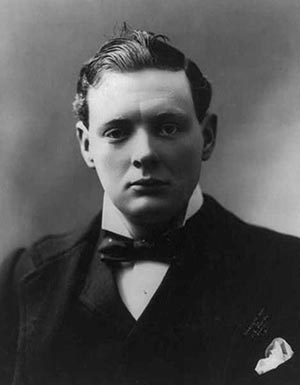 In March 1916, Churchill returned to England after he had become restless in France and wished to speak again in the House of Commons. In July 1917, Churchill was appointed Minister of Munitions, and in January 1919, Secretary of State for War and Secretary of State for Air. He lost his seat in 1922 whilst ill after surgery for appendicitis had prevented him from campaigning. He stood for the Liberals again in the 1923 general election, losing in Leicester, and then as an independent, first without success in a by-election in the Westminster Abbey constituency, and then successfully in the general election of 1924 for Epping. The following year, he formally rejoined the Conservative Party, commenting wryly that "anyone can rat, but it takes a certain ingenuity to re-rat."
In March 1916, Churchill returned to England after he had become restless in France and wished to speak again in the House of Commons. In July 1917, Churchill was appointed Minister of Munitions, and in January 1919, Secretary of State for War and Secretary of State for Air. He lost his seat in 1922 whilst ill after surgery for appendicitis had prevented him from campaigning. He stood for the Liberals again in the 1923 general election, losing in Leicester, and then as an independent, first without success in a by-election in the Westminster Abbey constituency, and then successfully in the general election of 1924 for Epping. The following year, he formally rejoined the Conservative Party, commenting wryly that "anyone can rat, but it takes a certain ingenuity to re-rat."
Churchill was appointed Chancellor of the Exchequer in 1924 under Stanley Baldwin and oversaw Britain's disastrous return to the Gold Standard, which resulted in deflation, unemployment, and the miners' strike that led to the General Strike of 1926. Churchill later regarded this as the greatest mistake of his life.
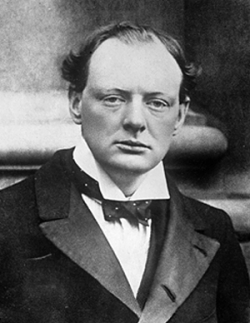 The Conservative government was defeated in the 1929 General Election. Churchill did not seek election to the Conservative Business Committee, the official leadership of the Conservative MPs. Over the next two years, Churchill became estranged from the Conservative leadership over the issues of protective tariffs and Indian Home Rule and by his political views and by his friendships with press barons, financiers and people whose characters were seen as dubious. When Ramsay MacDonald formed the National Government in 1931, Churchill was not invited to join the Cabinet. He was at the low point in his career, in a period known as "the wilderness years".
The Conservative government was defeated in the 1929 General Election. Churchill did not seek election to the Conservative Business Committee, the official leadership of the Conservative MPs. Over the next two years, Churchill became estranged from the Conservative leadership over the issues of protective tariffs and Indian Home Rule and by his political views and by his friendships with press barons, financiers and people whose characters were seen as dubious. When Ramsay MacDonald formed the National Government in 1931, Churchill was not invited to join the Cabinet. He was at the low point in his career, in a period known as "the wilderness years".
Churchill loudly opposed Mohandas Gandhi's peaceful disobedience revolt and the Indian Independence movement in the 1930s. As early as 1932 he spoke extensively of the need to hold onto Britain's colonies at all costs so that they could be used to establish land bases when the inevitable war broke out with Nazi Germany. He had vivid dreams night after night of the war in Europe breaking out as early as 1935. When war broke out in the Pacific, one of the first negotiations Churchill actioned was the exchange of fifty Destroyers for the use of landbases in the colonies by the American forces. He also felt that India was not ready for self government and he saw India as a cradle which could have been used to heal the rift between Christianity and Islam. He lectured about the potential he saw for an "unholy war" war erupting between religious zealots on both sides similar to the crusades of the middle ages. He was a great visionary and I wonder if the 'war on terror' could have been averted if he had been listened to.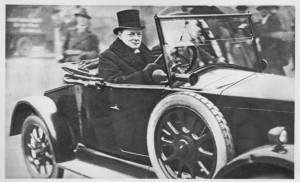 Beginning in 1932, when he opposed those who advocated giving Germany the right to military parity with France, Churchill spoke often of the dangers of Germany's rearmament. He was a lone voice calling on Britain to strengthen itself to counter the belligerence of Germany. He felt that the policy of appeasement with Germany was tantamount to "feeding our friends to the crocodiles in the hope that we will be eaten last!". He loudly proclaimed that giving in to the demands of the Nazi bullies was shameful in the extreme. Of course his lone voice was proven right.
Beginning in 1932, when he opposed those who advocated giving Germany the right to military parity with France, Churchill spoke often of the dangers of Germany's rearmament. He was a lone voice calling on Britain to strengthen itself to counter the belligerence of Germany. He felt that the policy of appeasement with Germany was tantamount to "feeding our friends to the crocodiles in the hope that we will be eaten last!". He loudly proclaimed that giving in to the demands of the Nazi bullies was shameful in the extreme. Of course his lone voice was proven right.
Hitler was waging an occult war that began in 1930 when he want to Tibet and bought back to Germany hundreds of Tibetan not-so-holy men to establish a Dark oracle in Nuremberg. If fact the Nazi's bought together large numbers of initiates from occult schools all over the world to launch their occult onslaught of Europe. They effectively disabled the conscience of the German people then used black magic to destroy the will to fight and resist in France. This went on and on. Many artifacts of occult significance where sought and taken back to Germany such as the Spear of Destiny. This was obtained from the Austrian Crown Jewels and is the actual spear that pierced Jesus' side on the cross. It has been wielded by every great conqueror of Europe for the last two thousand years from the likes of Charlemagne to Napoleon. Legend has it though that it's power will turn on anyone who wields it with impure motives. This artifact and many hundreds of others were secured by the Americans from and underground vault in Nuremberg and within hours Hitler was dead. If you want to know more about the occult side of the war then I suggest that you read 'The spear of destiny' by Trevor Ravenscroft. Many believe that the annexing of Tibet was actually allowed by the Allies after the war to ensure that the source of the occult power there which had been subverted was destroyed. I don't know about that but many do believe it to be so. I have to say that I personally am a great fan of the Dalai Lama who is one of the most amazing beings I have ever had the pleasure to sit with. Tibetian Buddhism is one of the few religions which seems to be evolving with the times.
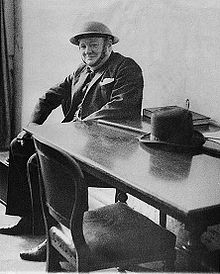
After the outbreak of the Second World War on 3 September 1939, the day Britain declared war on Germany, Churchill was appointed First Lord of the Admiralty and a member of the War Cabinet, as he had been during the first part of the First World War. When they were informed, the Board of the Admiralty sent a signal to the Fleet: "Winston is back". In this job, he proved to be one of the highest-profile ministers during the so-called "Phoney War", when the only noticeable action was at sea. Churchill advocated the pre-emptive occupation of the neutral Norwegian iron-ore port of Narvik and the iron mines in Kiruna, Sweden, early in the war. However, Chamberlain and the rest of the War Cabinet disagreed, and the operation was delayed until the successful German invasion of Norway.
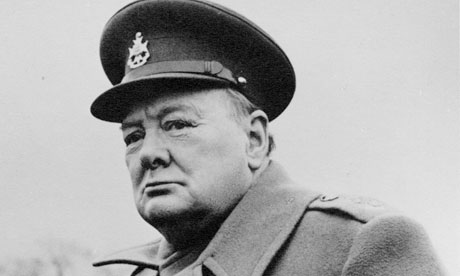 On 10 May 1940, hours before the German invasion of France by a lightning advance through the Low Countries, it became clear that, following failure in Norway, the country had no confidence in Chamberlain's prosecution of the war and so Prime Minister Chamberlain resigned. King George VI asked Churchill to be prime minister. He was 65 years old. No one else wanted the job and everyone believed it was certain failure. Winston remarked that this was the moment he had been being prepared for his whole life, he told those closest to him that he felt as though he was walking with destiny.
On 10 May 1940, hours before the German invasion of France by a lightning advance through the Low Countries, it became clear that, following failure in Norway, the country had no confidence in Chamberlain's prosecution of the war and so Prime Minister Chamberlain resigned. King George VI asked Churchill to be prime minister. He was 65 years old. No one else wanted the job and everyone believed it was certain failure. Winston remarked that this was the moment he had been being prepared for his whole life, he told those closest to him that he felt as though he was walking with destiny.
Winston was a hard taskmaster. He worked eighteen hour days fueled by eight large Cuban cigars each day, champagne, brandy and huge meals. No one could keep up with him. He spent long periods in the wee small hours staring off into space in a trance and then came forth with a hundred new ideas for the day. Most believed he was a genius on the brink of madness. He seemed to know what the enemy was planning and doing before it happened. 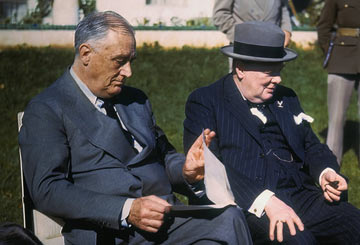 He would press forward with a strategy for days only to drop it and move onto another. Only later would it become obvious that he had done the wise thing by doing so and that he was keeping on step ahead of the enemy. He was the spearhead in a battle between the forces of enlightenment and the forces of darkness. When the darkness became overwhelming in Europe he would say he was taking on the darkness within himself to vanquish it, and retreat for hours to his room. Remember that by this time he had been a Mason for forty years and a Grand Master Mason for over thirty years and he was skilled in the transmutation and transformation of energy at the highest level. Perhaps the greatest magician of his age was not only Prime Minister of Britain but he was also leading the fight against the dark forces. He often would battle with what he called 'the black dog' within himself. He was of course literally alchemically containing the darkness within himself that was spreading over Europe and purifying it so as to ease the burden of the brave men and women who were fighting for our freedom. The energetic toll on him during these years was tremendous. He suffered several heart attacks during the war and had several bouts of pneumonia but nothing even slowed him down. President Franklin D Roosevelt had also been a Mason since 1911 and had also become a Grand Master in 1934. Together these two great Alchemist Warriors and Visionaries led the occult battle for the future of the Earth as the saviours of libery, enlightenment and wisdom. 'Never has so much been owed by so many to so few!'.
He would press forward with a strategy for days only to drop it and move onto another. Only later would it become obvious that he had done the wise thing by doing so and that he was keeping on step ahead of the enemy. He was the spearhead in a battle between the forces of enlightenment and the forces of darkness. When the darkness became overwhelming in Europe he would say he was taking on the darkness within himself to vanquish it, and retreat for hours to his room. Remember that by this time he had been a Mason for forty years and a Grand Master Mason for over thirty years and he was skilled in the transmutation and transformation of energy at the highest level. Perhaps the greatest magician of his age was not only Prime Minister of Britain but he was also leading the fight against the dark forces. He often would battle with what he called 'the black dog' within himself. He was of course literally alchemically containing the darkness within himself that was spreading over Europe and purifying it so as to ease the burden of the brave men and women who were fighting for our freedom. The energetic toll on him during these years was tremendous. He suffered several heart attacks during the war and had several bouts of pneumonia but nothing even slowed him down. President Franklin D Roosevelt had also been a Mason since 1911 and had also become a Grand Master in 1934. Together these two great Alchemist Warriors and Visionaries led the occult battle for the future of the Earth as the saviours of libery, enlightenment and wisdom. 'Never has so much been owed by so many to so few!'.
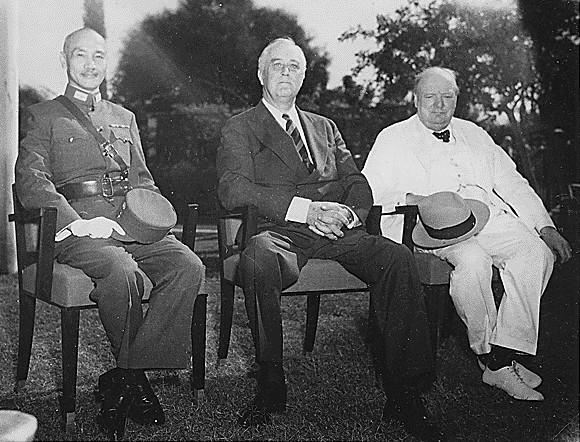 Churchill had been among the first to recognise the growing threat of Hitler long before the outset of the Second World War, and his warnings had gone largely unheeded. Although there was an element of British public and political sentiment favouring negotiated peace with a clearly ascendant Germany, among them the Foreign Secretary Lord Halifax, Churchill nonetheless refused to consider an armistice with Hitler's Germany. His use of rhetoric hardened public opinion against a peaceful resolution and prepared the British for a long war. Coining the general term for the upcoming battle, Churchill stated in his "finest hour" speech to the House of Commons on 18 June 1940, "I expect that the Battle of Britain is about to begin."By refusing an armistice with Germany, Churchill kept resistance alive in the British Empire and created the basis for the later Allied counter-attacks of 1942–45, with Britain serving as a platform for the supply of Soviet Union and the liberation of Western Europe.
Churchill had been among the first to recognise the growing threat of Hitler long before the outset of the Second World War, and his warnings had gone largely unheeded. Although there was an element of British public and political sentiment favouring negotiated peace with a clearly ascendant Germany, among them the Foreign Secretary Lord Halifax, Churchill nonetheless refused to consider an armistice with Hitler's Germany. His use of rhetoric hardened public opinion against a peaceful resolution and prepared the British for a long war. Coining the general term for the upcoming battle, Churchill stated in his "finest hour" speech to the House of Commons on 18 June 1940, "I expect that the Battle of Britain is about to begin."By refusing an armistice with Germany, Churchill kept resistance alive in the British Empire and created the basis for the later Allied counter-attacks of 1942–45, with Britain serving as a platform for the supply of Soviet Union and the liberation of Western Europe.
In response to previous criticisms that there had been no clear single minister in charge of the prosecution of the war, Churchill created and took the additional position of Minister of Defence. He immediately put his friend and confidant, the industrialist and newspaper baron Lord Beaverbrook, in charge of aircraft production. It was Beaverbrook's business acumen together with Winston's organisational skill that allowed Britain to quickly gear up aircraft production and engineering that eventually made the difference in the war. In a matter of weeks Winston implemented sweeping changes in the munitions and armaments production process that literally doubled production. Even after he had acomplished this feat, many still maintained that it was impossible so he swiftly dismissed them. He cut red tape and streamlined the defence funding process. He toured munitions plants and gave rousing speeches to the workers. After every bombing he would inspect the damages, often personally visiting those who lost loved ones to give his condolences. Most days he would spend a coulple of hours walking around London just talking to people in the street. He would sometimes stand in food queues for hours outside shops so that he understood what his people were going through. He often wept openly as he met with the embattled residents of his beloved London.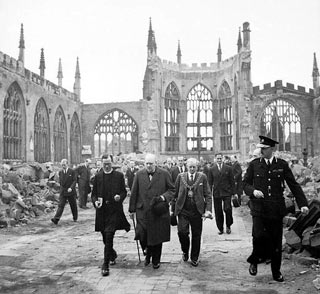 Churchill's speeches were a great inspiration to these embattled British people. His first speech as prime minister was the famous "I have nothing to offer but blood, toil, tears, and sweat".
Churchill's speeches were a great inspiration to these embattled British people. His first speech as prime minister was the famous "I have nothing to offer but blood, toil, tears, and sweat".
He followed that closely with two other equally famous ones, given just before the Battle of Britain. One included the words:
..." we shall fight in France, we shall fight on the seas and oceans, we shall fight with growing confidence and growing strength in the air, we shall defend our island, whatever the cost may be, we shall fight on the beaches, we shall fight on the landing grounds, we shall fight in the fields and in the streets, we shall fight in the hills; we shall never surrender".
The other:
"Let us therefore brace ourselves to our duties, and so bear ourselves, that if the British Empire and its Commonwealth last for a thousand years, men will still say, 'This was their finest hour'."
At the height of the Battle of Britain, his bracing survey of the situation included the memorable line "Never in the field of human conflict was so much owed by so many to so few", which engendered the enduring nickname The Few for the RAF fighter pilots who won it. Without having much in the way of sustenance or good news to offer the British people, he took a risk in deliberately choosing to emphasise the dangers instead.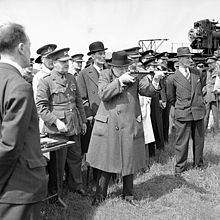
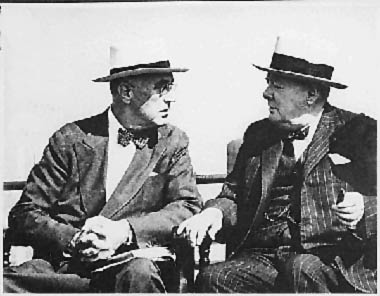 Churchill's good relationship with Franklin D. Roosevelt secured vital food, oil and munitions via the North Atlantic shipping routes. It was for this reason that Churchill was relieved when Roosevelt was re-elected in 1940. Upon re-election, Roosevelt immediately set about implementing a new method of providing military hardware and shipping to Britain without the need for monetary payment. Put simply, Roosevelt persuaded Congress that repayment for this immensely costly service would take the form of defending the US; and so Lend-lease was born. Churchill had 12 strategic conferences with Roosevelt which covered the Atlantic Charter, Europe first strategy, the Declaration by the United Nations and other war policies. After Pearl Harbor was attacked, Churchill's first thought in anticipation of US help was, "We have won the war!"
Churchill's good relationship with Franklin D. Roosevelt secured vital food, oil and munitions via the North Atlantic shipping routes. It was for this reason that Churchill was relieved when Roosevelt was re-elected in 1940. Upon re-election, Roosevelt immediately set about implementing a new method of providing military hardware and shipping to Britain without the need for monetary payment. Put simply, Roosevelt persuaded Congress that repayment for this immensely costly service would take the form of defending the US; and so Lend-lease was born. Churchill had 12 strategic conferences with Roosevelt which covered the Atlantic Charter, Europe first strategy, the Declaration by the United Nations and other war policies. After Pearl Harbor was attacked, Churchill's first thought in anticipation of US help was, "We have won the war!"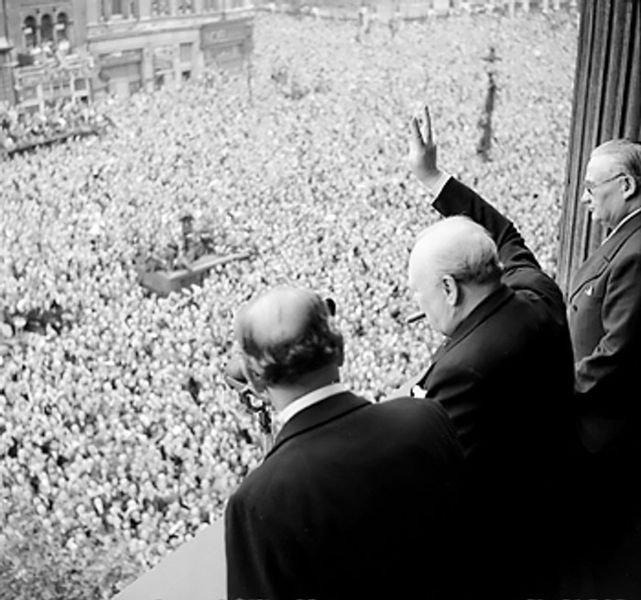 In June 1944, the Allied Forces invaded Normandy and pushed the Nazi forces back into Germany on a broad front over the coming year. The war in Europe was over!
In June 1944, the Allied Forces invaded Normandy and pushed the Nazi forces back into Germany on a broad front over the coming year. The war in Europe was over!
Although Churchill's role in the Second World War had generated much support for him amongst the British population, he was defeated in the 1945 election in a shocking display of ingratitude. For six years he was to serve as the Leader of the Opposition. After the General Election of 1951, Churchill again held the office of Minister of Defence between October 1951 and January 1952. He also became prime minister in October 1951, and his third government—after the wartime national government and the brief caretaker government of 1945—lasted until his resignation in April 1955.
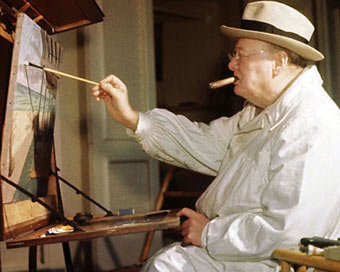 Winston Churchill was an accomplished artist and took great pleasure in painting, especially after his resignation as First Lord of the Admiralty in 1915. He found a haven in art to overcome the spells of depression, or as he termed it, the "Black Dog", which he suffered throughout his life.Churchill was also a prolific writer of books, writing a novel, two biographies, three volumes of memoirs, and several histories in addition to his many newspaper articles. He was awarded the Nobel Prize in Literature in 1953 "for his mastery of historical and biographical description as well as for brilliant oratory in defending exalted human values". He also received 7 honourary degrees and doctorates which he laughed about given his poor academic performance in his younger years. He said he had more degrees than he had passed examinations.
Winston Churchill was an accomplished artist and took great pleasure in painting, especially after his resignation as First Lord of the Admiralty in 1915. He found a haven in art to overcome the spells of depression, or as he termed it, the "Black Dog", which he suffered throughout his life.Churchill was also a prolific writer of books, writing a novel, two biographies, three volumes of memoirs, and several histories in addition to his many newspaper articles. He was awarded the Nobel Prize in Literature in 1953 "for his mastery of historical and biographical description as well as for brilliant oratory in defending exalted human values". He also received 7 honourary degrees and doctorates which he laughed about given his poor academic performance in his younger years. He said he had more degrees than he had passed examinations.
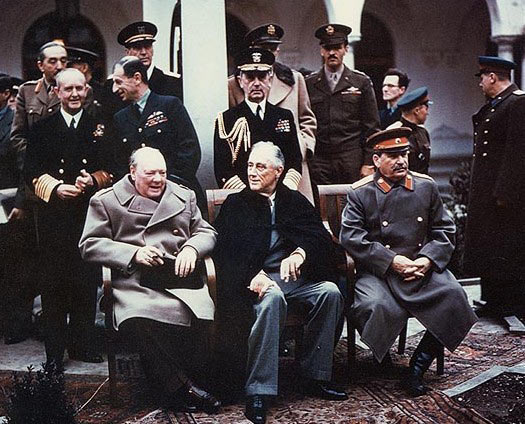 Churchill well understood the value of history and tradition, as he told the House of Commons in 1944, “A love of tradition has never weakened a nation; indeed it has strengthened nations in their hour of peril, but the new view must come, the world must roll forward ... Let us have no fear of the future.” He also, at one point, advised his listeners to “Study history, study history. In history lies all the secrets of statecraft.”
Churchill well understood the value of history and tradition, as he told the House of Commons in 1944, “A love of tradition has never weakened a nation; indeed it has strengthened nations in their hour of peril, but the new view must come, the world must roll forward ... Let us have no fear of the future.” He also, at one point, advised his listeners to “Study history, study history. In history lies all the secrets of statecraft.”
Churchill understood two things, that “The farther backward you can look, the farther forward you can see,” and that “Our past is the key to our future, which I firmly trust and believe will be no less fertile and glorious.” He knew history, he made history, and he was a historian; hence he, more than most, was able to see into the future, and in the 1930s he recognized the dangers emanating from Germany and the potential of war, while his political opponents chose to ignore this possibility. Or, as he so eloquently put it when addressing Prime Minister Neville Chamberlain in the House of Commons after the 1938 Munich Accords, “Britain and France had to choose between war and dishonor. They chose dishonor. They will have war.”
Many of his best known sayings were short and focused on principles that are as invaluable in private life as they are in the political arena.
Below is a brief selection:
• Once in a while you will stumble upon the truth but most of us manage to pick ourselves up and hurry along as if nothing had happened.
• The truth is incontrovertible, malice may attack it, ignorance may deride it, but in the end; there it is.
• A pessimist sees the difficulty in every opportunity; an optimist sees the opportunity in every difficulty.
• It’s not enough that we do our best; sometimes we have to do what’s required.
In a shocking display of ingratitude, the British voters rejected Churchill after he had so successfully led them fearlessly through war. In part, this was a result of sheer fatigue, after so many years of war (for the British it began in 1939 and only ended in 1945). Churchill’s electoral defeat was in part a result of the siren song of the Labour Party’s promises – promises that handcuffed the British economy from the end of the war until today, with only a measure of relief coming in the 1980s; promises that Churchill understood and clearly recognized as detrimental. His insights into the forms of government, the economy, and law were accurate and to the point:
• Many forms of Government have been tried and will be tried in this world of sin and woe. No one pretends that democracy is perfect or all-wise. Indeed, it has been said that democracy is the worst form of government except all those other forms that have been tried from time to time.
• The inherent vice of capitalism is the unequal sharing of blessings; the inherent virtue of socialism is the equal sharing of miseries.
• Socialism is the philosophy of failure, the creed of ignorance and the gospel of envy.
• Some people regard private enterprise as a predatory tiger to be shot. Others look on it as a cow they can milk. Not enough people see it as a healthy horse, pulling a sturdy wagon.
• If you have ten thousand regulations you destroy all respect for the law.
• There is no such thing as a good tax.
• Will the shutting out of foreign goods increase the total amount of wealth in this country? Can foreign nations grow rich at our expense by selling us goods under cost price? Can a people tax themselves into prosperity? Can a man stand in a bucket and lift himself up by the handle?
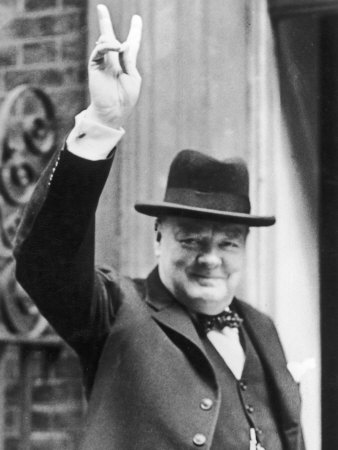 Churchill frequently spoke on the subjects of liberty, freedom, and tyranny (he was, after all, a wartime president). In fact he seems to have had an opinion on almost everything, including some of his allies (France and America), and in particular America and the Americans of whom he said that:
Churchill frequently spoke on the subjects of liberty, freedom, and tyranny (he was, after all, a wartime president). In fact he seems to have had an opinion on almost everything, including some of his allies (France and America), and in particular America and the Americans of whom he said that:
• You can always count on Americans to do the right thing - after they've tried everything else.
• I want no criticism of America at my table. The Americans criticize themselves more than enough.
Winston Churchill was a man ahead of his times, a man much needed in our time, a man who wrote and spoke much about tyranny. He understood, “Tyranny is our foe whatever trappings or disguise it wears, whatever language it speaks, be it external or internal, we must forever be on our guard, ever mobilised, ever vigilant, always ready to spring at its throat.” These words were as relevant then as they are today.
Winston's other favourite hobby was bricklaying. He built many of the retaining walls and out buildings at Chartwell himself.
Some of my other favourite quotes of Churchill's are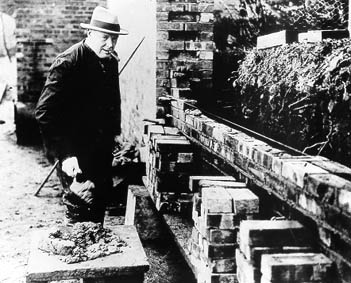 "If you are going through hell, keep going."
"If you are going through hell, keep going."
"Courage is what it takes to stand up and speak. Courage is also what it takes to sit down and listen."
"You have enemies? Good. That means you've stood up for something, sometime in your life."
"I am easily satisfied with the very best."
"A joke is a very serious thing."
"Attitude is a little thing that makes a big difference."
"A lie gets halfway across the world before the truth has a chance to get its pants on."
"I like pigs. Dogs look up to us. Cats look down on us. Pigs treat us as equals."
"Success is the ability to go from one failure to another with no loss of enthusiasm."
"A pessimist sees difficulty in every opportunity; an optimist sees opportunity in every difficulty."
"Continuous effort - not strength or intelligence - is the key to unlocking our potential."
"Men occasionally stumble over the truth, but most of them pick themselves up and hurry off as if nothing ever happened."
"Politics is the ability to foretell what is going to happen tomorrow, next week, next month and next year. And to have the ability afterwards to explain why it didn't happen."
"History will be kind to me for I intend to write it."
"Solitary trees, if they grow at all, grow strong."
The truth is incontrovertible. Malice may attack it and ignorance may deride it, but in the end, there it is.
Click here to learn about our Cosmosis Personal Growth Mentoring
You can read about Michael's Mentoring Philosophy here
You can learn more about the Cosmosis process here
You can read Michael's articles here
Click here to learn more about how Cosmosis works
Want to get started or learn more? Click here

